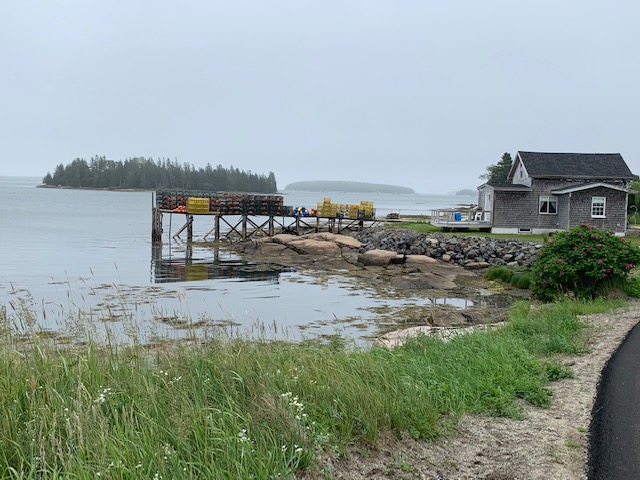
Local Knowledge: Key to Improving Local-Level Economic Data
Kristen Grant, Maine Sea Grant and UM Extension, UMaine MARINE seed grant recipient
Working with Maine Sea Grant’s Marine Extension Team since 1999, I’ve sat around tables with coastal community members at town halls and church halls, coffee shops and pizza shops for more than two decades. More recently those gatherings were relegated to a laptop screen. My preference has always been for in-person conversations where the in-between times are available for venturing from the agenda to share personal experiences that build relationships.
My extension visits over the last few years in the rural Downeast fishing communities of Jonesport and Beals have been packed with these in-between times, providing many opportunities for getting to know folks as they shared their ideas and knowledge of their local economy. With a seed grant from UM MARINE, our team of partners* works together to identify an approach for improving the accuracy and accessibility of economic information available to guide local-level decision-making in small, rural communities like Jonesport and Beals.
Maine is the most rural state in the country with most of its rural communities overly dependent on natural resource-based economies and facing environmental change and uncertainties about the future. Small-town municipal officials are tasked with decision-making related to their communities’ adaptation to environmental changes and other socially and economically disruptive events. To guide local-level decision-making, these communities need accurate local-level socio-economic information.
To begin to address this need in Maine, Maine Sea Grant worked with partners in Maine alongside economists from NOAA’s Office of Coastal Management to develop and pilot a tool to provide zip code level socioeconomic data for coastal communities. Outreach to socially vulnerable rural communities in Maine clarified the need for additional supports for these communities. Then in spring of 2022, our team of partners held a series of local conversations in Jonesport and Beals to identify key community-driven questions related to the local economy and the best possible data were compiled to address those questions. But at scales this small, even the best possible data is likely to have a fairly wide margin of error. So the best way to check the data is to ask the people who know best and in spring 2023, these data were ground truthed through the local knowledge of community members during a series of engagement workshops.
Key themes to emerge include:
- American Community Survey tracks primary employment, but these community members rely on diverse sources of income.
- Covid-19 resulted in significant changes in local industry composition which are not well reflected in available data.
- Fisheries landings data is inaccurate and the two communities need to be evaluated as a whole, rather than separately.
- Trend toward larger commercial fishing vessels as a result of regulatory changes that consolidate the industry.
- Need to account for economic trends of seasonal residents extending their stays in the communities and the increase in remote workers.
- Developing a system to collect and deliver data from seafood dealers could improve local level decision-making.
In my experience, extension work in any given community is never really concluded, but instead it progresses to another phase. This is true for Jonesport and Beals where our team of partners will develop a dashboard to make selected data available to the towns for planning. We’ll also clarified lessons learned that could potentially be applied coastal communities like Jonesport and Beals across the state.
*Partners: Towns of Jonesport and Beals, Maine Sea Grant and UM Extension, UM Machias, Sunrise County Economic Council, and Downeast Institute
- U.S. Census Bureau, 2010
- James & Aadland, 2011
- Soucy et al., 2020; McClenachan, 2019; Safford and Hamilton, 2010
- Bower, 1985
